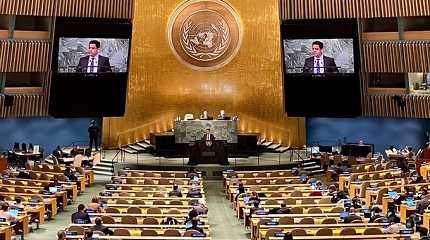
UNITED NATIONS, Nov 10 (APP): Pakistan told the UN General Assembly Thursday that it considers as a “national responsibility” the safety and security of its nuclear power plants and research reactors, which are under the International Atomic Energy Agency (IAEA) safeguards.
Speaking in the 193-member Assembly on the annual report of the Vienna-based UN agency, Ambassador Aamir Khan said that Pakistan had developed a comprehensive nuclear safety and security regime based on an extensive legislative and regulatory framework governing the security of nuclear materials, radioactive substances, associated facilities and activities.
That regime, he said, was regularly reviewed and updated in light of the IAEA guidance documents and international best practices, noting that the safety and verification aspects of the Agency’s mandate remain its important pillars.
As regards the strengthening of the safeguards system, Aamir Khan, who is the deputy permanent representative of Pakistan to the UN, stresses the need for a balanced approach between the promotional aspects and safety or security related concerns in all of the Agency’s functions.
While sharing the view that all States should fully comply with their respective safeguards obligations, he said that the Agency’s safeguards should not be used to serve partisan political objectives.
“Its verification regime could remain credible only if it is applied on a non-discriminatory basis, as stipulated in the Agency’s Statute,” the Pakistani envoy said.
Noting that the old consensus on disarmament and non-proliferation has broken down, Ambassador Aamir Khan proposed convening a special session of the UN General Assembly to evolve a new consensus that responds to the current and emerging realities and offers equal security to all states, large and small.
“This new consensus should eliminate the discrimination and double standards that characterize the present non-proliferation arrangements,” he said, adding that it should also evolve an agreed basis for the promotion of the peaceful uses of nuclear energy under appropriate international safeguards.
In his comments, Aamir Khan also said that harnessing nuclear technology is a priority for Pakistan for the pursuit of the Sustainable Development Goals (SDGs).
“We view nuclear energy as a reliable, consistent and carbon-free source of electricity generation,” he stressed.
Pakistan’s efforts to expand nuclear power generation and to increase its share in the national energy mix are driven by the fact that it is not only an energy-deficient country but also one of the most vulnerable countries to the impact of climate change.
“The recent debilitating effects of climate change—which are being felt strongly by my own country in the wake of the recent unprecedented floods—have heightened vulnerabilities of other countries and people around the globe,” he said.
The ongoing floods in Pakistan showed the urgent need for global action to curb greenhouse gas emissions, Aamir Khan said. One-third of Pakistan remained under water and 33 million people are in tatters, with losses and damages amounting to a tenth of Pakistan’s gross domestic product (GDP).
“Such global issues require global solutions, and close and unrestricted cooperation,” the Pakistani envoy said.
“In fact”, he added, “access to nuclear power is the need of the hour.”




